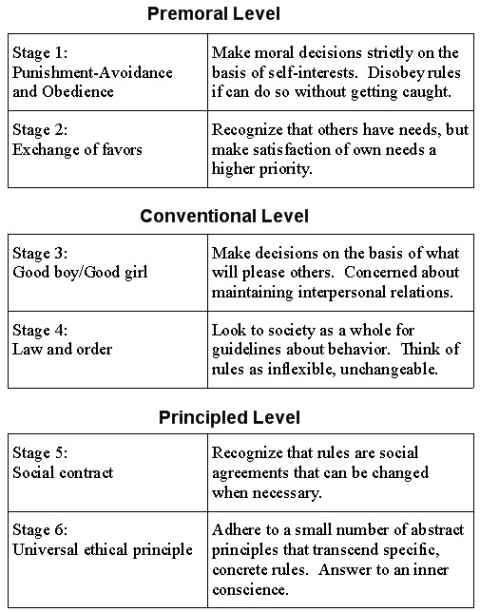- Kohlberg’s six-stage theory was an extension of Jean Piaget’s cognitive development theory (how people learn and use knowledge is affected by both social and psychological factors).
- Kohlberg extended on Piaget’s theory, proposing that moral development is a continual process that occurs
 throughout the lifespan (the stage you are in life determines your level of moral development).
throughout the lifespan (the stage you are in life determines your level of moral development). - Kohlberg based his theory on interviews with groups of young children.
- In the interviews, a series of moral dilemmas were presented to children, who were then interviewed to determine the reasoning behind their judgments of each scenario.
- Based on the reasoning of choice he received, he determined a stage of moral development that individual would be on.
- “The Heinz Dilemma” was a moral dilemma that he explained to his interviewees and then questioned them on the reasoning behind the decision they would make, he used the results to
- determine the individual’s level of moral development.
Moral Judgement
Moral judgment is making decisions based on whether or not they are right or wrong. They are many theories as to where young children develop moral judgment. Some argue that they learn it from experiences such as being punished or rewarded when displaying a certain type of behavior. Piaget outlined morality as an individual’s respect for rules and justice. He brought forth the idea that children learn moral sense from the interactions between the social world as well as their inner thoughts.
Objections to the Kohlberg theory
- Does moral reasoning necessarily lead to moral behavior? The big difference between knowing what we ought to do versus our actual actions
- Is justice the only aspect of moral reasoning we should consider? Compassion, caring and other interpersonal feelings may play an important part in moral reasoning as well
- Does Kohlberg’s theory overemphasize Western philosophy? Eastern cultures may have different moral outlooks
- Carol Gilligan claims that Kohlberg was biased in his research, as he only surveyed males, and did not females. This would corrupt results because males and females are instilled different beliefs and values according to their sex. For example, males are taught to be independent and abstract, while females are taught to be nurturing, caring, and affectionate


@babyz
@anam
perhaps this video can be of assistance, it helped me rationalize these concepts.
http://www.youtube.com/watch?v=GTzBrjxKHLg
I cant understand, plz help me to understand this theory?
I would like to know how is this moral theory connected to the teaching- learning scenario?